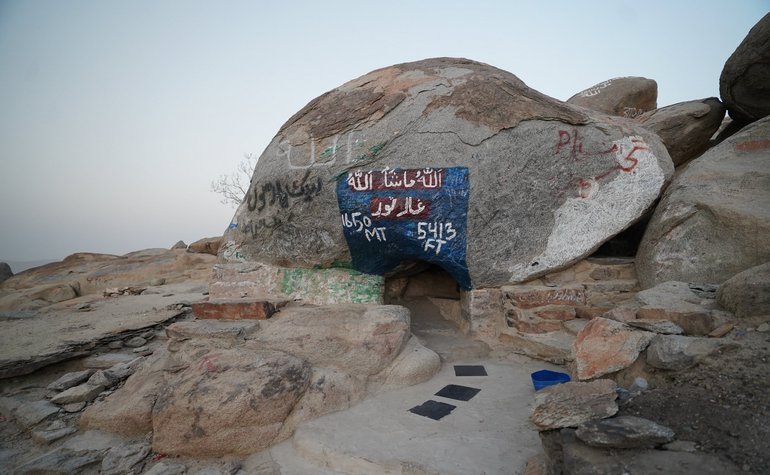


Mount Thawr (or Jabal Thawr) is the mountain that contains the cave in which the Prophet (peace and blessings of Allah be on him) and Abu Bakr (may Allah be pleased with him) sought refuge for three days and nights from the Quraysh, as they left Makkah and emigrated to Madinah.
When the Prophet (peace and blessings of Allah be on him) and Abu Bakr (may Allah be pleased with him) arrived at the cave on Mount Thawr, Abu Bakr (may Allah be pleased with him) entered first to clear away anything that might injure the Prophet (peace and blessings of Allah be on him). He found a few holes and stuffed them with pieces of cloth. The Prophet (peace and blessings of Allah be on him) then entered and went to sleep on Abu Bakr’s (may Allah be pleased with him) lap. Suddenly, something stung Abu Bakr’s (may Allah be pleased with him) foot, but he did not twitch, fearing he would wake the Prophet (peace and blessings of Allah be on him). The pain was so intense that tears began to run down his cheeks and onto the Prophet’s (peace and blessings of Allah be on him) face. The Prophet (peace and blessings of Allah be on him) woke up and saw that Abu Bakr (may Allah be pleased with him) was in pain. He applied his spittle on the injury and the pain disappeared.


Standing at Arafat is the fundamental requirement of Hajj and pilgrims come here on the 9th Dhul Hijjah (second day of Hajj).
The common meaning of the word Arafat is ‘to know’. After being taken out of Jannah and placed on Earth, it was here that Adam (upon him be peace) and Hawa (upon her be peace) met up.
Standing on Arafat is an essential part of the Hajj; whoever misses the standing on Arafat has missed Hajj, because the Prophet (peace and blessings of Allah be on him) said: “Hajj is Arafat.” [al-Hakim]
The day of Arafah has many virtues, as was narrated in many Ahadith. Aisha (may Allah be pleased with her) narrated that the Prophet (peace and blessings of Allah be on him) said: “There is no day in which Allah sets free more souls from the fire of hell than on the day of Arafat. And on that day Allah draws near to the earth and by way of exhibiting His Pride remarks to the angels, ‘What is the desire of these (servants of mine)?’” [Muslim]
In another Hadith the Prophet (peace and blessings of Allah be on him) said: “Apart from the day of the Battle of Badr there is no day on which the Shaitan is seen to be more humiliated, more rejected, more depressed and more infuriated, than on the day of Arafat, and indeed all this is only because of beholding the abundance of descending mercy (on the day) and Allah’s forgiveness of the great sins of the servants.“ [Mishkat]
The masjid above is Masjid Nimrah and is located on the plain of Arafat. When the Prophet (peace and blessings of Allah be on him) was at Arafat on his farewell Hajj on the ninth day of Dhul Hijjah 10 AH (632 CE) he camped here. After midday he delivered his famous sermon (reproduced below) at Waadi Urana nearby while seated on his camel, after which he led the salah. More than 100,000 Sahabah accompanied him on this Hajj.
After praising, and thanking Allah the Prophet (peace and blessings of Allah be on him) said: “O People, lend me an attentive ear, for I know not whether after this year, I shall ever be amongst you again. Therefore listen to what I am saying to you very carefully and take these words to those who could not be present today. O People, just as you regard this month, this day, this city as Sacred, so regard the life and property of every Muslim as a sacred trust. Return the goods entrusted to you to their rightful owners. Hurt no one so that no one may hurt you. Remember that you will indeed meet your Lord, and that He will indeed reckon your deeds. Allah has forbidden you to take usury (interest), therefore all interest obligation shall henceforth be waived. Your capital, however, is yours to keep. You will neither inflict nor suffer any inequity. Allah has judged that there shall be no interest and that all the interest due to Abbas ibn ‘Abdul Muttalib (Prophet’s uncle) shall henceforth be waived…Beware of Shaitan, for the safety of your religion. He has lost all hope that he will ever be able to lead you astray in big things, so beware of following him in small things.O People, it is true that you have certain rights with regard to your women, but they also have rights over you. Remember that you have taken them as your wives only under Allah’s trust and with His permission. If they abide by your right then to them belongs the right to be fed and clothed in kindness. Do treat your women well and be kind to them for they are your partners and committed helpers. And it is your right that they do not make friends with any one of whom you do not approve, as well as never to be unchaste.O People, listen to me in earnest, worship Allah, say your five daily prayers (Salah), fast during the month of Ramadan, and give your wealth in Zakat. Perform Hajj if you can afford to.All mankind is from Adam and Eve, an Arab has no superiority over a non-Arab nor a non-Arab has any superiority over an Arab; also a white has no superiority over black nor a black has any superiority over white except by piety and good action. Learn that every Muslim is a brother to every Muslim and that the Muslims constitute one brotherhood. Nothing shall be legitimate to a Muslim which belongs to a fellow Muslim unless it was given freely and willingly. Do not, therefore, do injustice to yourselves.Remember, one day you will appear before Allah and answer your deeds. So beware, do not stray from the path of righteousness after I am gone.O People, no prophet or apostle will come after me and no new faith will be born. Reason well, therefore, O People, and understand words which I convey to you. I leave behind me two things, the Quran and my example, the Sunnah and if you follow these you will never go astray.
All those who listen to me shall pass on my words to others and those to others again; and may the last ones understand my words better than those who listen to me directly. Be my witness, O Allah, that I have conveyed your message to your people”.
Shortly after the Prophet (peace and blessings of Allah be on him) had finished addressing the people, he received a revelation from Allah: “Today I have perfected your religion for you and completed My favour upon you, and I have chosen Islam as your religion.” [5:3]
In the second century of Islam, Masjid Nimrah was built at the spot where the Prophet (peace and blessings of Allah be on him) delivered the sermon and led the salah.


This is a view of Muzdalifah, where Hajj pilgrims arrive after sunset from Arafat on the 9th Dhul Hijjah (second day of Hajj).
Muzdalifah stretches from the Valley of Muhassar to the mountains of Ma’zamayn. It is four kilometres long and covers an area of 12.25 square kilometers.
Referring to Muzalifah, Allah (Glorified and Exalted is He) mentions in Surah Baqarah in the Quran:“When you leave Arafat, then remember Allah at the Mash’arul Haram.” (‘The Sacred Monument’, referring to Muzdalifah according to Abdullah bin Umar (may Allah be pleased with him))
During the farewell Hajj, the Prophet (peace and blessings of Allah be on him) performed the Maghrib and Isha salats together at Muzdalifah. He stayed at the spot where the present Masjid Mash’arul Haram currently is (towards the Qibla side). From there, the Prophet (peace and blessings of Allah be on him) said:“Although I am staying here, you may stay anywhere throughout Muzdalifah.” [Muslim]
During Hajj It is waajib to perform Maghrib and Isha together in Muzdalifah at Isha time. Wuqoof (stay) of Muzdalifah is also waajib and it’s time begins from sub’h saadiq and ends at sunrise. If one spent even a little portion of their time in Muzdalifah, he/she will be absolved of this obligation. However, it is best to remain until just before sunrise.
Although pebbles for pelting the Jamarat may be collected from anywhere, they are best collected from Muzdalifah.
Muzdalifah is also called ‘Jam’ as it is a place where people gather.
This is a section of Mount Uhud, in front of which the second battle in Islam (the Battle of Uhud) took place in 3 AH. Of this mountain the Prophet (peace and blessings of Allah be on him) declared, “This mountain loves us and we love it.” [Muslim]
After the humiliating defeat in the Battle of Badr a year earlier, the Quraysh of Makkah made preparations to muster a great army to fight the Muslims again and take revenge. They assembled an army of 3000 soldiers with 300 camels, 200 horses and 700 coats of mail. Wives and daughters of slained chiefs in Badr accompanied the army to see with their own eyes the spectacle of the killers being killed. Hind, the daughter of Utbah was the leader of the womens section and her husband Abu Sufyan was the commander-in-chief of the Makkan army. Both were not Muslims at the time but bitter enemies of Islam. The left and right flanks were commanded by Ikrimah ibn Abi Jahl and Khalid bin Waleed respectively. Amr ibn al-As was named the commander of cavalry and his task was to co-ordinate attack between the cavalry wings. (All three subsequently became Muslims and become great generals of Islam).
This facility can be added along with transportation that you book with us.

Note: All fares advertised are subject to availability and start from the prices we have mentioned. Fares are only guaranteed until ticketed. Offers may be withdrawn without any prior notice.
We accept following mode of payments ![]()
Many of the flights and flight-inclusive holidays on this website are financially protected by the ATOL scheme. But ATOL protection does not apply to all holiday and travel services listed [in this brochure/on this website]. Please ask us to confirm what protection may apply to your booking. if you do not receive an ATOL Certificate then the booking will not be ATOL protected. If you do receive an ATOL certificate but all the parts of your trip are not listed on it, those parts will not be ATOL protected. Please see our booking conditions for information, or for more information about financial protection and the ATOL Certificate go to: www.atol.org.uk/ATOLCertificate